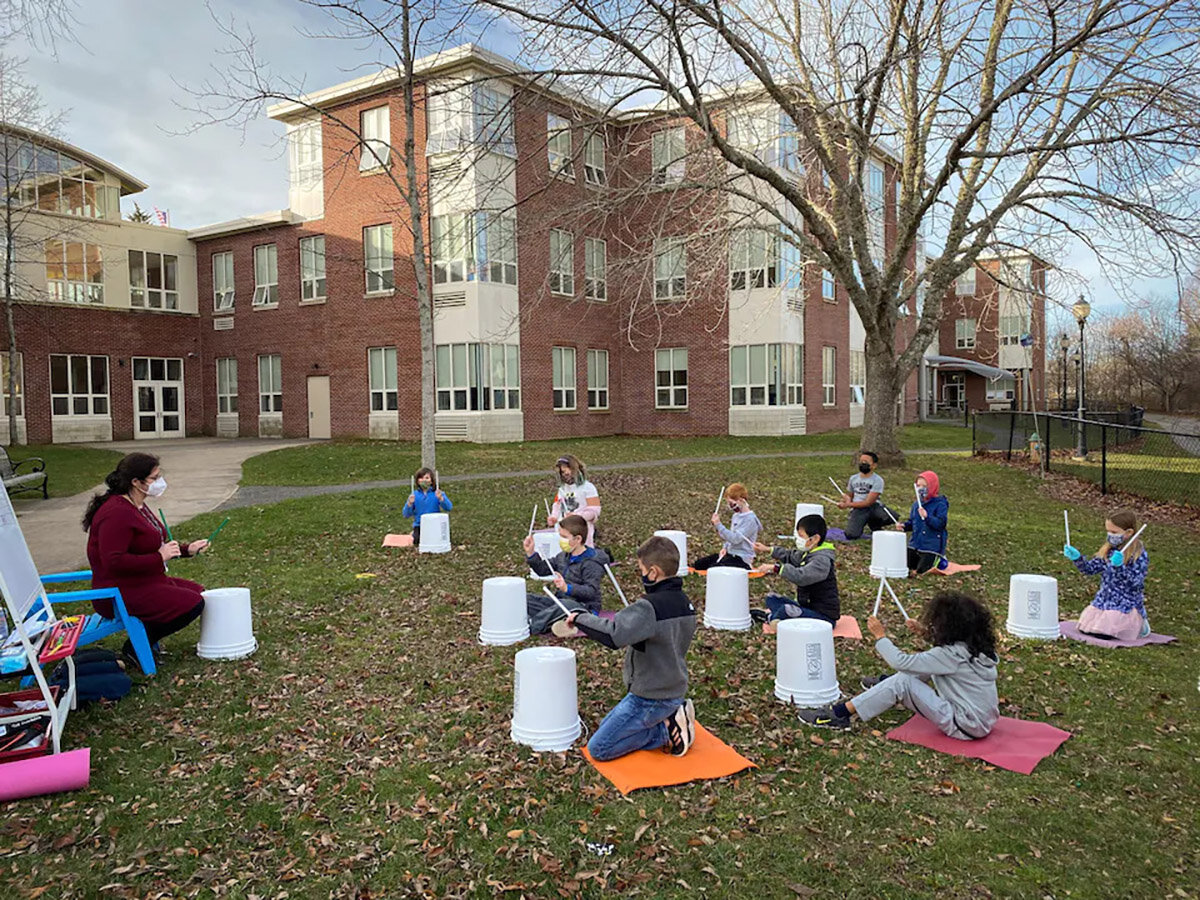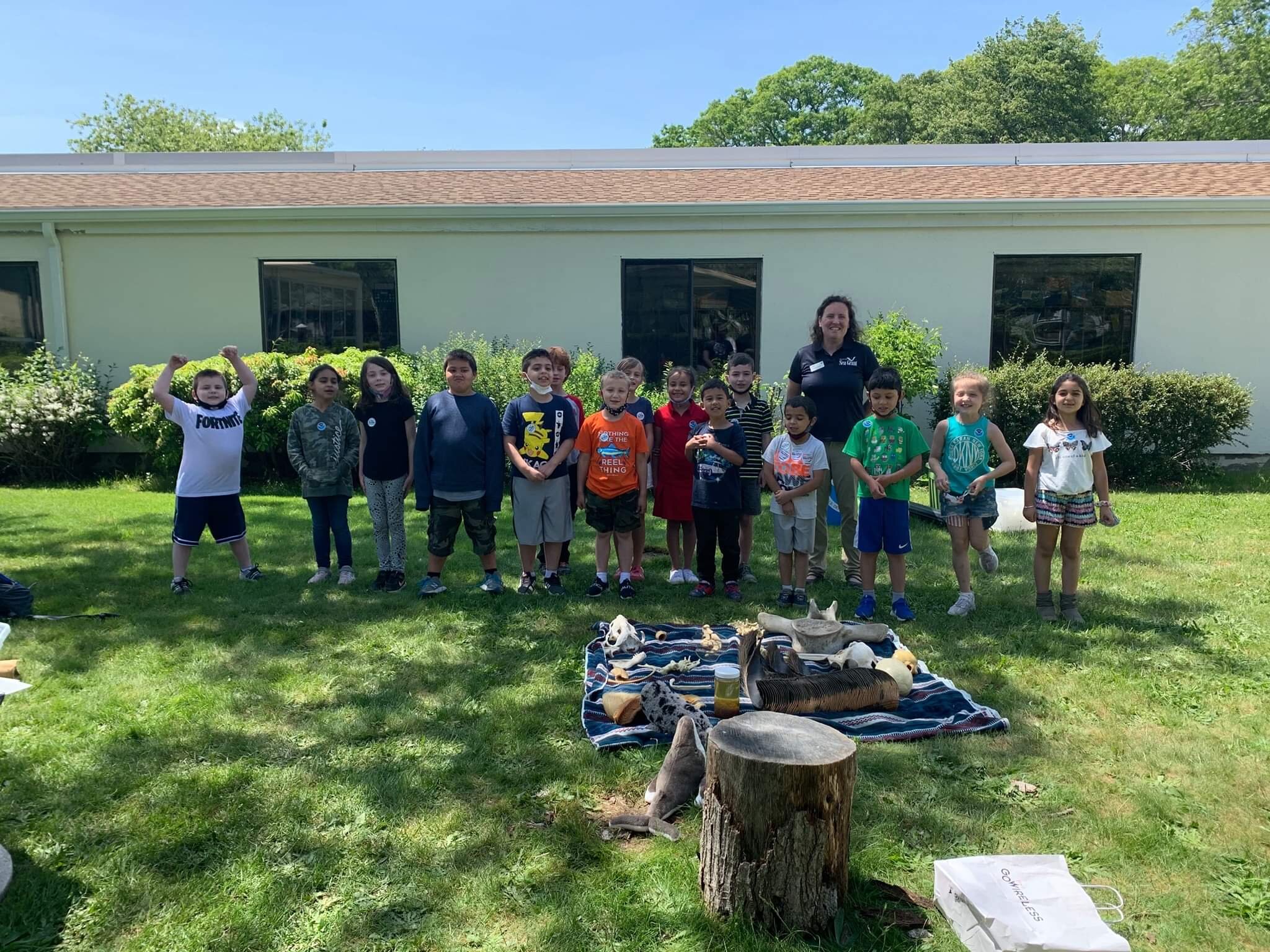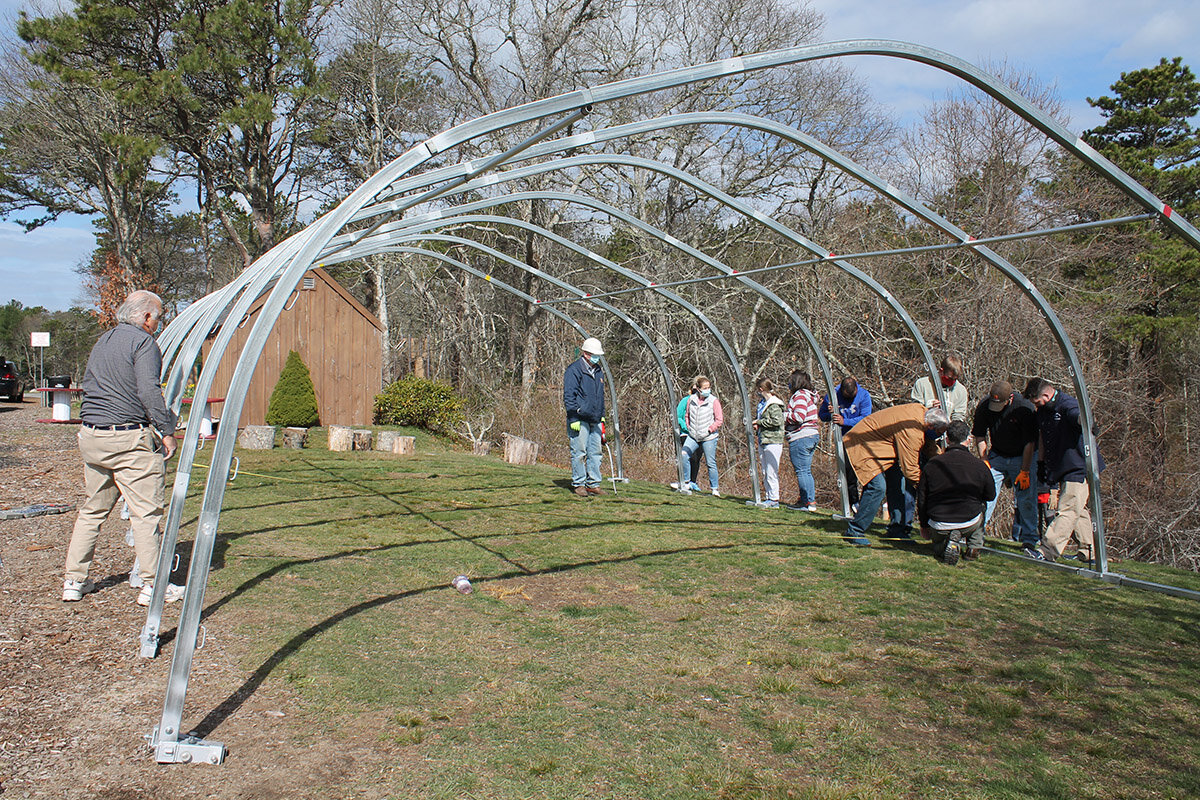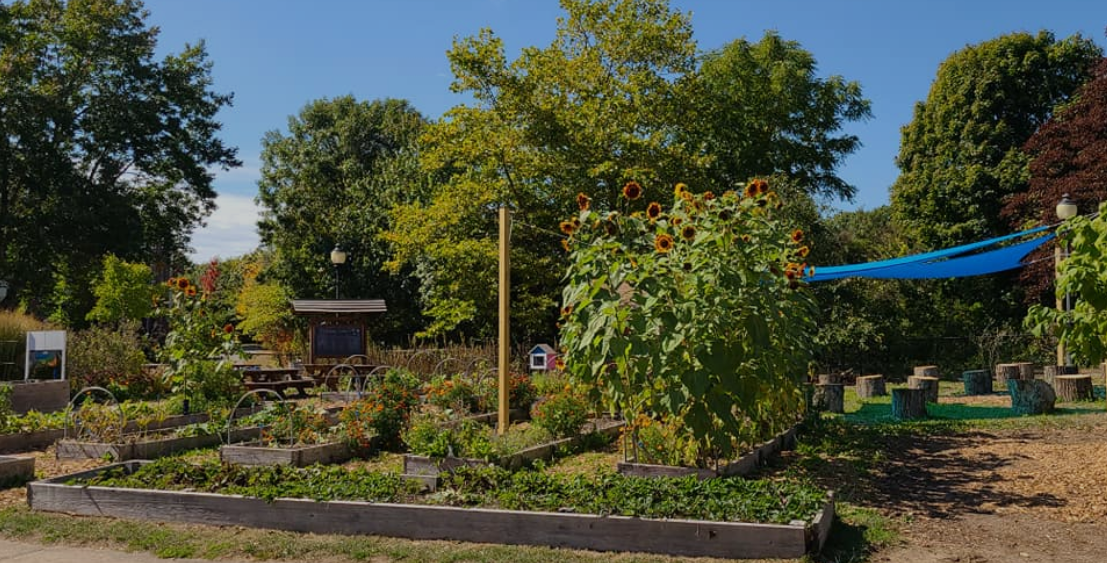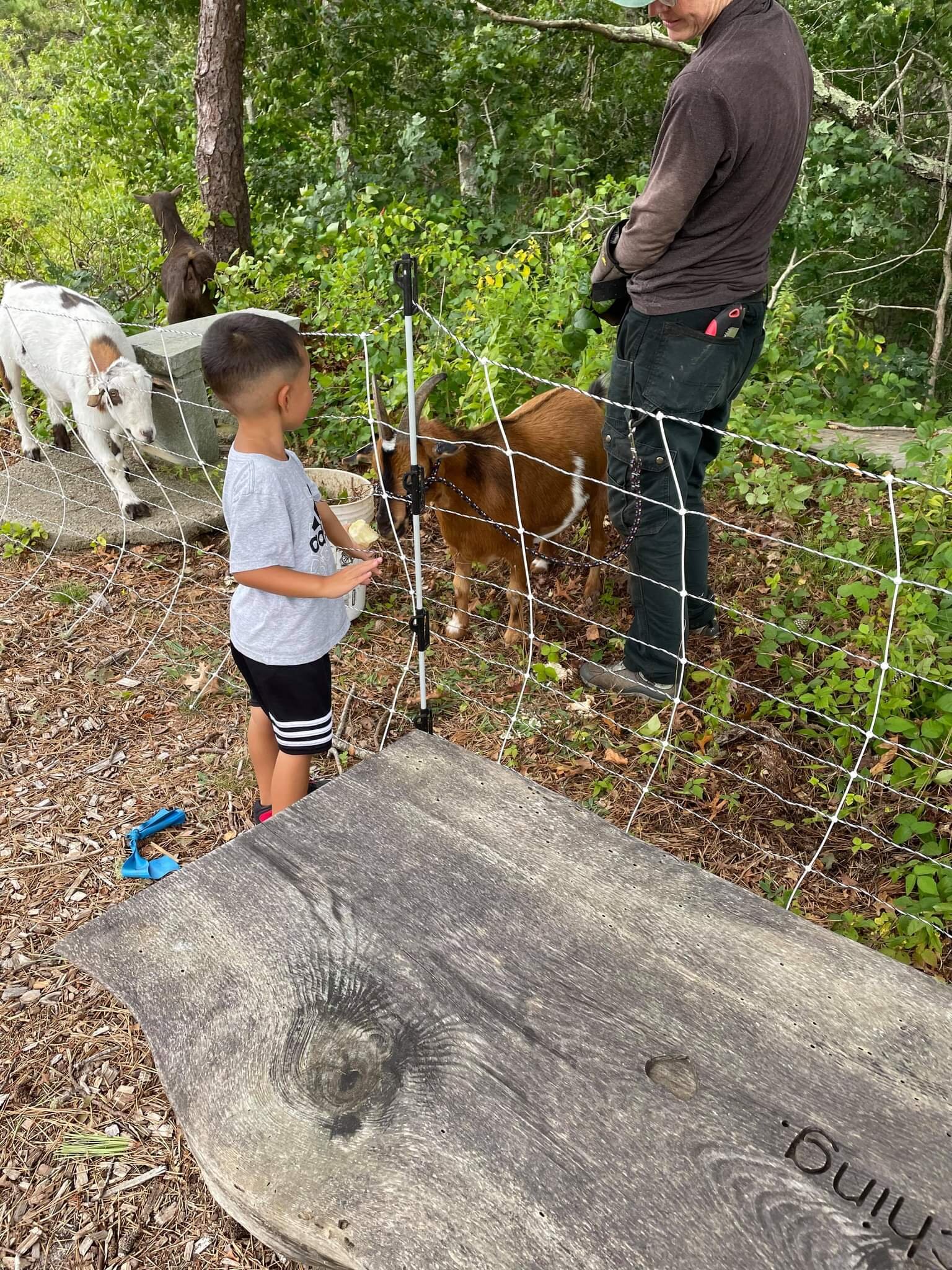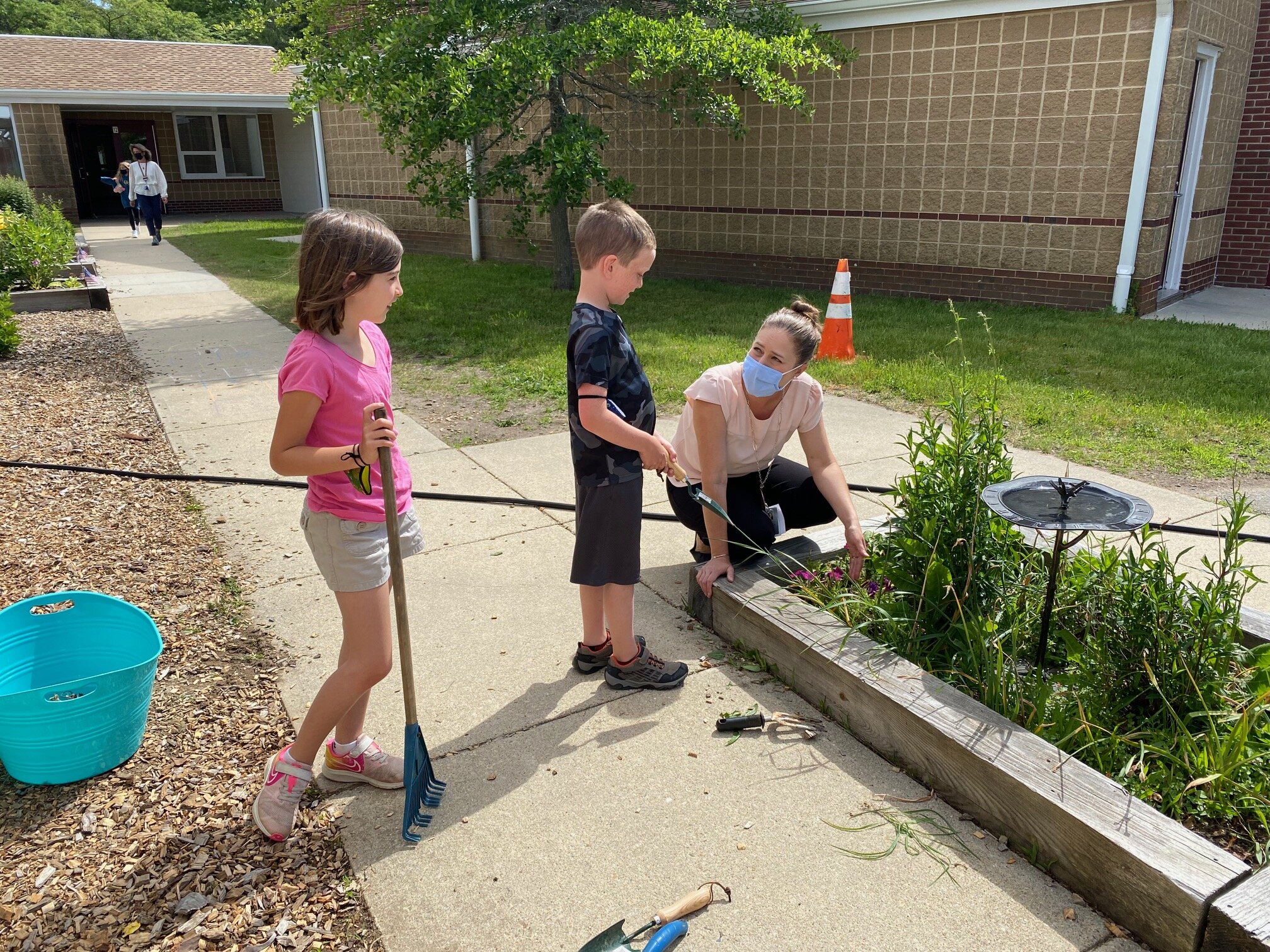Falmouth Public Schools
Falmouth, Massachusetts
Amy Leonardi and Dr. Sonia Tellier gave a presentation to the NCOLI Community of Practice for Schools and Districts Moving Learning Outside on September 28, 2021.
Falmouth Public Schools, a moderately sized district in Falmouth, Massachusetts, on Cape Cod, was an early adopter of outdoor learning during the pandemic. When many schools’ doors were shuttered during long stretches of the pandemic, the seven Falmouth public schools made the most of the outdoors — and their community’s resources, time, and talents — and remained open for the 2020–21 school year. Even in the winter snow, teachers and students continued learning outside. The district was about to build outdoor classrooms with the support of over $100,000 in grant funding.
Recognizing how beneficial the time outside has been for both students and adults, they plan to continue their outdoor learning programming in the 2021–22 school year.
Amy Leonardi (Chair of the Falmouth Outdoor Learning Project and Vice President of Falmouth Rotary Club) and Dr. Sonia Tellier (Assistant Superintendent and Director of Teaching and Learning for Falmouth Public Schools) shared how their outdoor learning will continue and grow in a September 2021 Community of Practice presentation. Please click on the video (left) to watch the presentation.
Previous Programming and Pandemic Response
Interview
In April 2021, we asked Amy Leonardi, a parent and activist within the Falmouth Public Schools, to answer a few questions about outdoor learning in her district. The responses were edited by Kyle Macdonald, Senior Manager for Green Schoolyards America.
Q: How did your school district use your outdoor spaces before the COVID-19 pandemic?
Amy Leonardi: Before the pandemic, most of the outdoor spaces were used mainly for enjoyment, breaks, lunch, and recess. Several of the schools already had gardens and garden programs as part of their curriculums, so many teachers were already somewhat familiar with that aspect. Our district had also used many of the local conservation areas and beaches for enrichment of specific units of study.
Currently all schools use outdoor learning in various manners. This has been increasing as the benefits become more obvious.
September 22, 2020 – Recorded Falmouth School Committee presentation by Amy Leonardi about the outdoor learning work happening within the district. Presentation begins at 29:10.
Q: How did your district bring education outside this year? In all schools? What percentage of them?
AL: We began by planning in the summer knowing that we had to act as early as possible in order to make infrastructure and supply decisions as well as plan for the long term. We worked in conjunction with our superintendent and school administration. We made a plan to facilitate the various outdoor needs at all the schools in our district, with the lower levels having a larger focus on the outdoor learning due to the ease of the curriculum integration. As the grades rise, the focus turns more to music, band, science, and emotional/social health needs.
A volunteer committee was formed by the Rotary Club of Falmouth Cape Cod developed with Rotarians, volunteer parents, and students. We created a leadership team to work with each individual school’s needs and requests. We also have subcommittees tackling:
Curriculum integration
Grants/Fundraising
Professional development
Collaboration with community partners
Outdoor shelters such as permanent tents, sun sails, etc.
Media outreach
Outreach to other districts
Early on we launched a social media page and website to put out requests for supplies early in the year for items such as:
Tree stumps for seating and math games
Plastic buckets for music and ceramics students
Recess bags and supplies
Seated desks
Picnic tables
Outdoor whiteboards
Clipboards
The response was impressive. Over 1,000 feet of yoga mat material was donated by Apache Mats for seating. Brownie troops and volunteers as far away as Maine made plastic homemade sit-upons to be used for seating. Scoop seating as options for flexible seating were also donated by local company Cape Cod Aggregates. The community rallied to the cause.
District Education Data
7 schools
3,029 students,
PK-12th grade288 teachers
Approximately 100 acres of school grounds
38% of students qualify for free/reduced lunch
Location
Falmouth, Massachusetts
Small town on Cape Cod with about 31,500 residents
Climate
Warm summers, up to 80°F
Cold winters, down to 20°F or less
Precipitation: year-round, about 100 days per year
Rain: 49'“ per year
Snow: 30” per year
Q: How did you prepare your staff and community to take learning outside this year?
AL: We surveyed staff and faculty on their current knowledge of outdoor learning, their motivation to learn more, and the perceived obstacles in place. We targeted three things: the need for professional development; supplies to facilitate outdoor learning; and community partners for off-site learning and enrichment, utilizing guest scientists and lecturers.
Q: How did your district plan and implement your outdoor classroom infrastructure? What was involved? Who did you find to help you with this? Were permits needed?
AL: We began by forming a committee of volunteers from the community with the school administration’s blessing. We involved stakeholders from all over the community including parents, nonprofits, teachers, retirees, and more. We envisioned a multi-phased approach.
To begin with, we looked to fulfill any immediate needs for the return to school in the fall, including identifying zones at each school that could be used, facilitating seating including using tree logs, purchasing individual student bags for recess and outdoor learning. Volunteers helped and continue to help cleaning up school gardens, relining class zones, and working on various subcommittees to help meet needs as they came up.
The second phase included finding more permanent solutions for shelters. We settled on Weatherport tents, which could withstand our New England weather and be left up year-round. While permits were needed, the town waived the fees for these after various presentations. We were also given the blessing to have volunteers install the tents with the facilities department under the supervision of licensed contractors or engineers. Currently there is one shelter at each school which was put up through volunteer work. We also surveyed our teachers to find out their current level of knowledge of outdoor learning, willingness to learn more, and perceived obstacles.
We found that the community was extremely generous and supportive. We now have over 1200 hours of volunteer time in since July.
We have also partnered with educational supplier Copernicus Educational Products Inc. The company asks for ideas from our district for products that may be helpful as well as sends test products to us to use to facilitate outdoor learning. One of the newest items was an outdoor “clever board” with an add-on microscope so students can view items they explore outside on a large screen in depth.
Other local artisans have begun preparing sample outdoor weather stations, weighted scales, and more to be used in the various gardens.
Planning for Outdoor Learning
Q: What types of planning and implementation did you do related specifically to COVID health needs?
AL: Outdoor hand sanitizer stations were put into place at all entrances of schools. We use tree logs as much as possible for seating due to wood sanitation rules. Students maintain distance and wash their hands frequently.
We did research, and sought expert advice from the Centers for Disease Control, the World Health Organization, our local board of health, and our school pediatrician. The benefits of outdoor learning for both physical health and mental health are so great that it just makes sense.
Q: How is it going for you now? Tell me a little bit about the logistics involved in being outside.
AL: So far it is going well with the students, staff, and community. The response has been overwhelmingly positive.
We also know that our families and students have been hit hard in the area of mental health. Studies have shown that students who learn outdoors develop a greater sense of self, independence, confidence, creativity, decision-making and problem-solving skills, empathy toward others, motor skills, self-discipline, and initiative. Anything we can do to help in this area is absolutely critical.
Some of the logistics we worked with as we planned included the schools setting up schedules and zones for outdoor learning. The principals set up a shared document at their schools to sign up for the different spaces. Additionally, we had to plan for upkeep of those spaces. Volunteers at some schools reline outdoor field zones on a bimonthly basis. During spring and fall volunteers help with cleaning up the school gardens. Our district is also working to hire for a district-wide Learning Partner Specialist who will help with this project moving forward.
Teachers and staff are helping students learn to be respectful of the outdoor learning spaces by walking quietly next to classes who are learning.
Our project is the first public school district wide effort in the state of Massachusetts to create outdoor learning. We have been featured in the New York Times, an international story with CBC Canada, many local articles — including an article highlighting the dedication of our community to service above self. We have also been featured at Rotary District conferences. We have also presented at the spring MTA teacher union offerings.
To date, we have raised over $100,000 in grants, donations, and supplies. We continue to look forward to strengthening our efforts for our children, our community, and our future.
Enjoying being outdoors and planning for the future
Q: Are teachers and students enjoying being outside?
AL: Students rave about being outside to their parents. Students have stated that they feel happier, concentrate better, and enjoy being outdoors whenever possible.
“It is easier for me to focus outside. The fresh air helps me stay calm and concentrate," according to Ethan Gordineer, one of the 4th graders.
Being able to include music outside, which was especially affected by the pandemic, was critical as well. Music is vital to all of our mental health, so having dedicated teachers willing to be outside even on some of the coldest days teaching and spreading joy was such a blessing.
“When you listen to the teachers, they are overwhelmed with gratitude and joy. This project has generations working together,” according to Superintendent Lori Duerr. "From an educational standpoint, it is not good to nonstop be connected to technology. Relationships and socializing is essential to successful students and it is really difficult to achieve that while remote/online learning. I recommend this to everyone. I believe without a doubt that this is the best solution that we have, considering the situation.”
"Kids love it; they can move, enjoy the fresh air. And it gives them the opportunity to take off their masks." Colleen Durepo, Grade 4 teacher, North Falmouth Elementary School.
Q: What’s next? Do you think you will continue to use outdoor learning as part of your overall approach after COVID is over?
AL: Our plan has always been that we are running a marathon and not a sprint. We hope to build outdoor learning to last long beyond the pandemic and prove that student performance and mental health will trend positive the more we integrate it into everything we do. One of our goals is to work further with faculty to develop outdoor pedagogy and provide training for teachers who are interested in making outdoor learning a bigger part of their lesson planning.
We believe we are all stakeholders in this. We are shaping the future generations to see not only problem-solving in action, but also how a community can come together across all differences for a common goal. Together, we believe we can raise the next generation of critical thinkers to come together in service above self, to be respectful of our planet, and to be stewards of humanity. Together we can accomplish anything.
Update — Where We are Now
Fall 2021 update coming soon!
Media Coverage
“Outdoor Learning Opportunities A Priority In Falmouth”
— The Enterprise, September 8, 2021
“Falmouth’s Community Comes Together to Provide Outdoor Classrooms for Students”
— WeatherPort, August 18, 2021
“Classrooms Without Walls, and Hopefully Covid”
— New York Times, October 27, 2020
“Outdoor lessons inhibit the spread of COVID-19; parents raise money for supplies”
— Cape Cod Times, October 9, 2020
“Outdoor Classrooms Surge in Popularity Amid Virus Concerns”
— CAI News, October 5, 2020
“Falmouth Outdoor Learning Committee Is On A Roll As School Begins”
— The Falmouth Enterprise, September 18, 2020
“The Falmouth OUtdoor Learning Committee”, FCTV Falmouth, September 30, 2020
Additional Resources and Partners
Falmouth Outdoor Learning Committee Facebook Group
Facebook Group used for organizing volunteers for the Falmouth Outdoor Learning Committee.
The Falmouth Outdoor Learning Project Website
Website with a blog, media links, and contact information tells the story of the project and collects donations to help purchase supplies for outdoor learning.
WeatherPort
This company offers fabric buildings, tents and other shade structures.
ApacheMills
Apache offers a wide range of eco-conscious, innovative doormats fabricated from recycled materials.
300 Committee
A private, non-profit land trust, whose mission is to permanently preserve and protect open space in Falmouth through acquisition, education, and stewardship.
Credits
This page features an interview with Amy Leonardi, a parent and activist within the Falmouth Public Schools, from April 2021 that was conducted by Kyle Macdonald, Senior Manager for Green Schoolyards America.
This page was updated and edited in September 2021 by Lauren McKenna, Program Manager, Green Schoolyards America.
National COVID-19 Outdoor Learning Initiative
The National COVID-19 Outdoor Learning Initiative supports schools and districts around the country in their efforts to reopen safely and equitably using outdoor spaces as strategic, cost-effective tools to increase physical distancing capacity onsite and provide access to abundant fresh air. The Initiative seeks to equitably improve learning, mental and physical health, and happiness for children and adults using an affordable, time-tested outdoor approach to keeping schools open during a pandemic.


